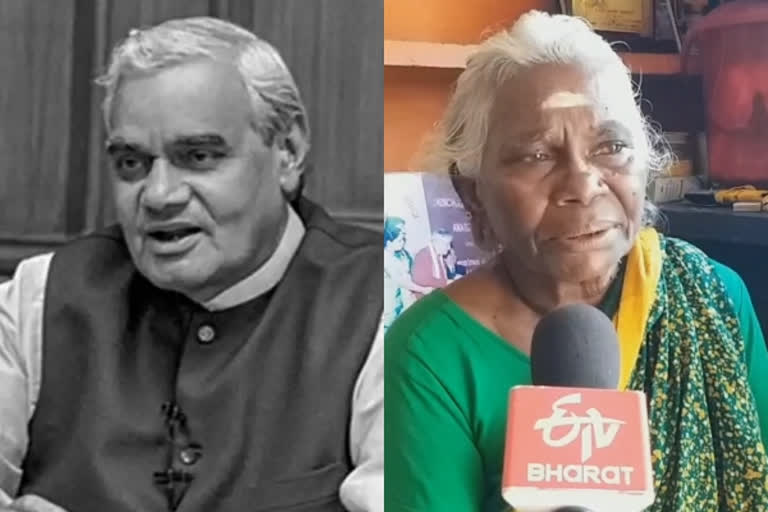Madurai:Tamil Nadu's temple city, Madurai has remembered former Prime Minister Atal Bihari Vajpayee as a very humble person who touched the feet of a woman in 2001.
A function in Vigyan Bhavan in Delhi, a village lady by name P. Chinnapillai was to be awarded the Streeshakthi Award for her work in empowering rural women. She hailed from a small village called Pulliseri in Madurai district.
At the time of giving the award, Vajpayee stunned the world by bending down and touching the feet of Chinnapillai for her contribution to women's empowerment through a non-governmental organisation Dhan Foundation.
The very name Atal Bihari Vajpayee conjures up memories of a decent politician, a suave and skilful parliamentarian, an RSS swayamsevak, a poet, an orator, a BJP leader, loved by friends and foes alike. He had several firsts: the first BJP Prime Minister, the first non-Congress PM who lasted his full term, the first Indian minister to have addressed the UN General Assembly in Hindi; the first BJP leader respected by rivals such as Pandit Jawaharlal Nehru, Indira Gandhi.
A member of Parliament 10 times and a member of Rajya Sabha twice, Vajpayee (1924-2018) is still remembered as the gentle and soft face of the BJP. Coinciding with Christmas, his birthday we celebrate with warmth on the cold December day is an occasion to take a ride down Madurai lane, a seemingly unlikely avenue to remember a leader born in Gwalior, Madhya Pradesh. Indeed there are emotional memories about Madurai in Tamil Nadu, which connect with the Hero of Kargil War, no less grand than those involving Mahatma Gandhi.
Rewind the clock to 1999
It was a venue in metro with all trappings of an elitist ambience; swanky, stylish building; sophisticated people strutting about, dressed in their glossy best, refined and urbane words tripping gently from the tongue; a far cry from a village tucked away in a remote corner of the country, dusty, desolate and deserted, where the people, coarse, unlettered and ghettoized, steeped in penury and ignorance, lead a desperate life.
It was Vigyan Bhavan in New Delhi brimming with festive spirit and happy-go-lucky air. The occasion was a function held by the Union Ministry of Women and Child Development to distribute what was then called the Stree Shakti Puraskar Awards to the deserving women who were reputed to have achieved the feat of women empowerment.
Against the high-voltage atmosphere on the dais were dignitaries in pomp and regalia. Prime Minister AB Vajpayee was distributing the awards as the announcer kept on reciting the names one by one. The turn for the woman from Madurai came. All eyes riveted on her, the woman ascended the step to the dais; in her fifties and in the simplest cotton saree, earlobes dropping emptily with no jewel adorning them, face, brows and forehead furrowed and smelling of rustic pristine purity. The little over a four-foot-tall woman had been added to the list of achievers after thorough official scrutiny.
For a splitting second, the PM, the topmost symbol of power in the country, was staring into the innocent, guileless eyes of the woman, the symbol of the bottom rung of the society. As he had, about three decades ago, seen the woman PM as Durga, the Goddess of Power, so now he glimpsed ‘Shakti’ (another term for Goddess of Power) in this most fragile village woman though they were far apart in age, education, social status, power et al. Then, what happened…. hey presto, the top representative of political power came down and reached for the feet of the representative of the hoi polloi.
The audience at that moment and the media the next day (social media were just in the womb of time then) were all taken by surprise. Of course, so was the woman P.Chinnapillai who, shaking with disbelief at the magical moment, face blushing, if aged, tried to lift Vajpayee, in the midst of a thundering ovation the hall was reverberating with.
As the famous phrase goes, on that fine day the woman woke up to name and fame.
